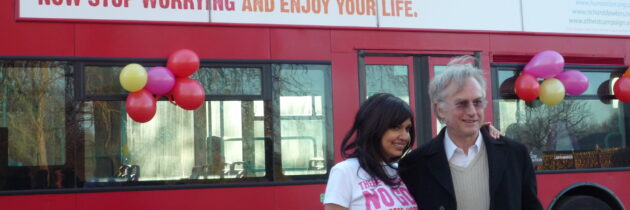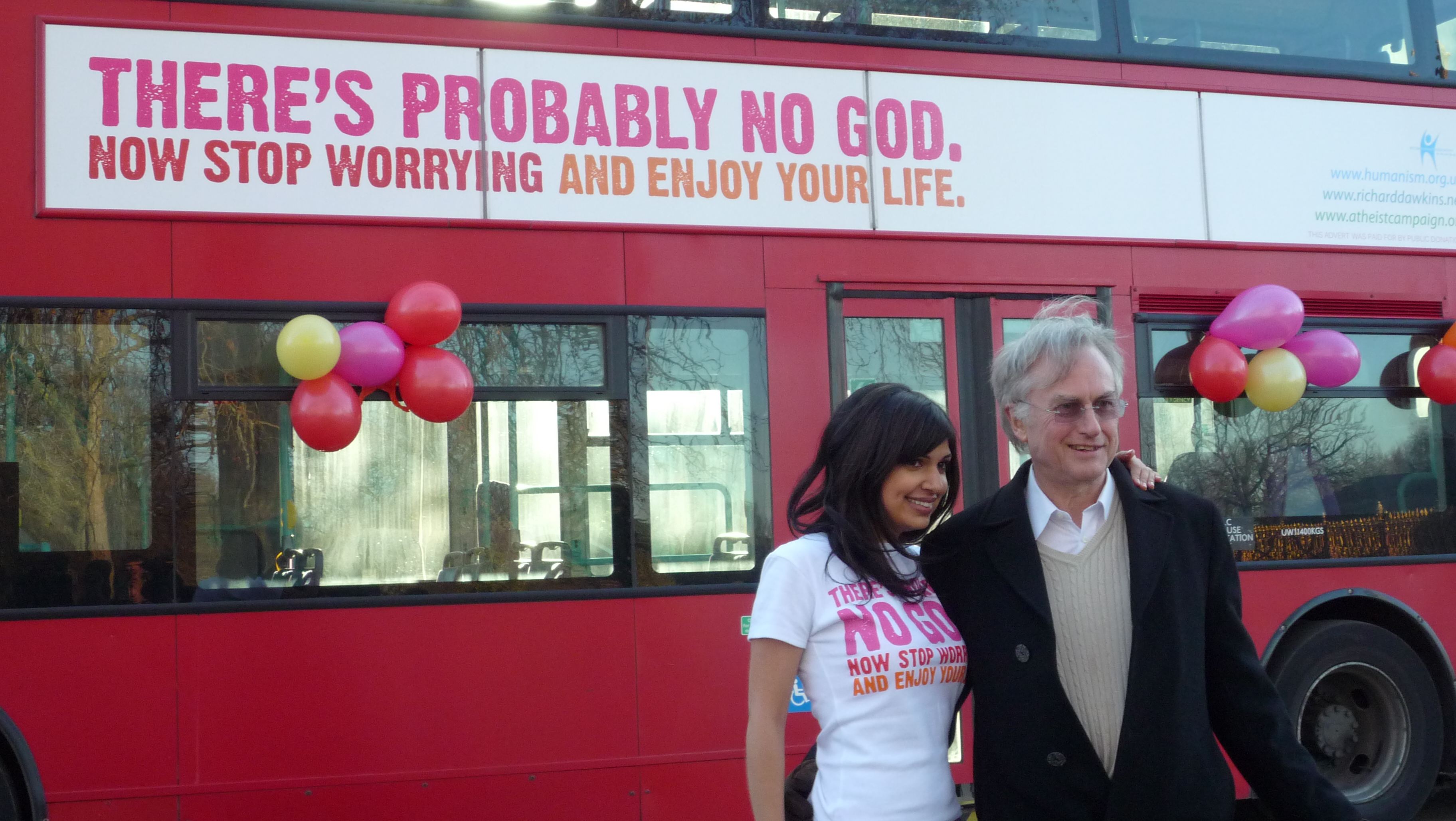Zizek, Enjoyment, and the Atheist Bus Campaign
Along with his penchant for dirty jokes and obsession with American movies, philosopher Slavoj Zizek’s willingness to discuss trivia such as national differences in toilet design is easily mocked. But Zizek’s interest in everyday details is part of his unique gift to communicate Marxist philosophy and Lacanian psychoanalysis to a popular audience. Zizek is therefore the perfect guide to help us interpret the recent atheist bus campaign. Running on buses worldwide, the advertisements carry a slogan penned by U.K. comedy writer Ariane Sherine: “There’s probably no God. Now stop worrying and enjoy your life.” What is of interest here is not the premise – “There’s probably no God” – which is of course the obvious point of the campaign, and functions as an intervention in an established public debate about the existence of a being with a certain name and qualities.
Rather, the ideological key of the slogan is the second sentence: “Now stop worrying and enjoy your life.” These words can be read in a modest way as indicating that the existence of ‘god’ is not a question worth worrying about, and the consequence of accepting the premise will be relief from such worry and the freedom to enjoy life more fully. But the slogan gains its power by invoking the Freudian understanding that individuals cannot enjoy themselves because of external prohibitions they have internalized. This is the problem addressed by psychoanalysis: “Traditionally, psychoanalysis was expected to allow the patient to overcome the obstacles which prevented him/her the access to normal sexual satisfaction: if you are not able to ‘get it,’ go to the analyst who will enable you to get rid of your inhibitions.” ((Slavoj Zizek, “God is Dead, but He Doesn’t Know It,” available at http://www.lacan.com/essays/?p=184))
Our atheist bus advertisement is therefore a psychoanalysis in miniature. While religion elevates social conventions into the commands of an angry ‘God’ who threatens eternal torment for illicit sexual behaviour, atheism is the therapy to free believers from their sexual repressions so they can have a more free, interesting, and varied sex life. Or to put it in more conventional terms, the slogan is a hedonist’s Pascal’s wager: ‘god’ may or may not exist, but it is clear you’ll have more pleasure if you do not believe; therefore, don’t worry about it.
But despite being an atheist himself, Zizek does not advocate traditional psychoanalysis, because we are now “bombarded from all sides by different versions of the injunction ‘Enjoy!’, from direct enjoyment in sexual performance to enjoyment in professional achievement or in spiritual awakening.” ((Ibid.)) For Zizek, the task of psychoanalysis is no longer to dispel inhibitions but to overcome this injunction to enjoy. Why is the imperative to enjoy problematic? Because it creates its own repressed prohibitions and guilt.
First, because the modern subject is officially a hedonist, it is not enjoyment but prohibition that is repressed, disguised in the form of political correctness and scientific truth-statements. “You have a society which is ostensibly oriented toward pure pleasure, but you pay for it through a whole series of ‘you can’t.’ The hidden prohibitions: eat whatever you want, but beware of fat and cholesterol; smoke, but beware of nicotine; sex, but safe sex. Yet the ultimate consequence of this pleasure principle is that everything is prohibited in a way; you can’t smoke: there’s nicotine; you can’t eat: there’s fat; you can’t have sex: you’ll get sick. So this is a kind of everyday confirmation of the Lacanian paradox… ‘If God does not exist, everything is prohibited.‘” ((Slavoj Zizek, “Hidden Prohibitions and the Pleasure Principle,” available at http://www.egs.edu/faculty/slavoj-zizek/articles/hidden-prohibitions-and-the-pleasure-principle/))
Second, rather than feeling guilty for desiring and enjoying the transgression of conventional morality, modern hedonists feel guilty for their failure to be happy. “Nowhere is this clearer than in the case of Viagra, the potency pill that promises to restore the capacity of male erection in a purely biochemical way, bypassing all problems of psychological inhibitions and so on. Now Viagra takes care of the erection, there is no excuse, you can enjoy sex so you should enjoy it, otherwise you are guilty.” ((Slavoj Zizek, “The Superego and the Act,” available at http://www.egs.edu/faculty/slavoj-zizek/articles/the-superego-and-the-act/)) Before, if you were unhappy you had an excuse, you were repressed. Now, there are no inhibitions, and so unhappiness is shameful, a guilty failure to enjoy what you should.
Thus, if Zizek is right, the atheist bus campaign does not represent a bold departure from the lingering Puritanism of the Christian era, but simply reiterates the ruling ideology of our time, exemplified in Coca-Cola’s 2000 slogan “Enjoy.” And like caffeine-free diet Coke, this commandment to enjoy is “pure semblance, an artificial promise of a substance which never materialized.” ((Ibid.)) Rather than freeing us to enjoy life to the full, hedonist atheism simply moves ‘god’ deeper into the unconscious, telling us not only what to do but that we should enjoy doing it. Therefore, this situation should inspire us to ask if God is truly the primary obstacle of our enjoyment.
Michael
Latest posts by Michael (see all)
- Do Doctors Need Consciences? - November 4, 2016
- Does Ethics Need God? Hell, Monsters, and Nihilism in William Lane Craig’s Apologetics - October 13, 2014
- Zizek, Enjoyment, and the Atheist Bus Campaign - October 17, 2013


